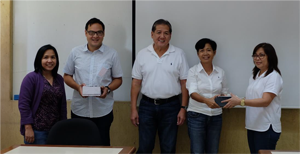 A project on the transfer and adoption of a technology that addresses White Spot Syndrome Virus (WSSV) in shrimps was recently completed.
A project on the transfer and adoption of a technology that addresses White Spot Syndrome Virus (WSSV) in shrimps was recently completed.
The two-year project was funded by the Philippine Council for Agriculture, Aquatic and Natural Resources Research and Development of the Department of Science and Technology (DOST-PCAARRD).
Developed by Dr. Mary Beth B. Maningas of the University of Sto. Tomas, Manila, the technology uses loop-mediated isothermal amplification (LAMP) assay for the detection of WSSV in shrimps.
The Juan Amplification (JAmp), a LAMP-based kit specific for WSSV, contains DNA extraction procedure and a LAMP assay master mix with specifically designed primers for the detection of WSSV. A locally fabricated heat block compatible with the LAMP reaction was also designed.
The results can be viewed on-site using a fitted black light in the heat block. The protocol and components of the kit make the process simple, time efficient, and capable of DNA extraction and amplification without a high level of expertise.
The technology was pilot tested in 25 grow-out farms in Regions 2, 3, 4-A, 4-B, 6, 7, 9, 11, and 12. It was also adopted in five hatcheries in Regions 3, 5, 7, and 12.
 The LAMP assay technology was introduced to the shrimp farm owners and operators of grow-out farms and hatcheries and they were briefed on the goal of technology transfer.
The LAMP assay technology was introduced to the shrimp farm owners and operators of grow-out farms and hatcheries and they were briefed on the goal of technology transfer.
Several farms and hatcheries were also selected as a pilot testing site for the LAMP assay. Selected sites were oriented on the technology and provided with field demonstrations, hands-on activities, and the kit manual.
Details of the LAMP reaction were disclosed such as required amount of samples, total time of reaction and visualization of reaction.
The LAMP kit helps in improving farm management practices and reduce the country’s dependence on expensive and imported diagnostic kits.
